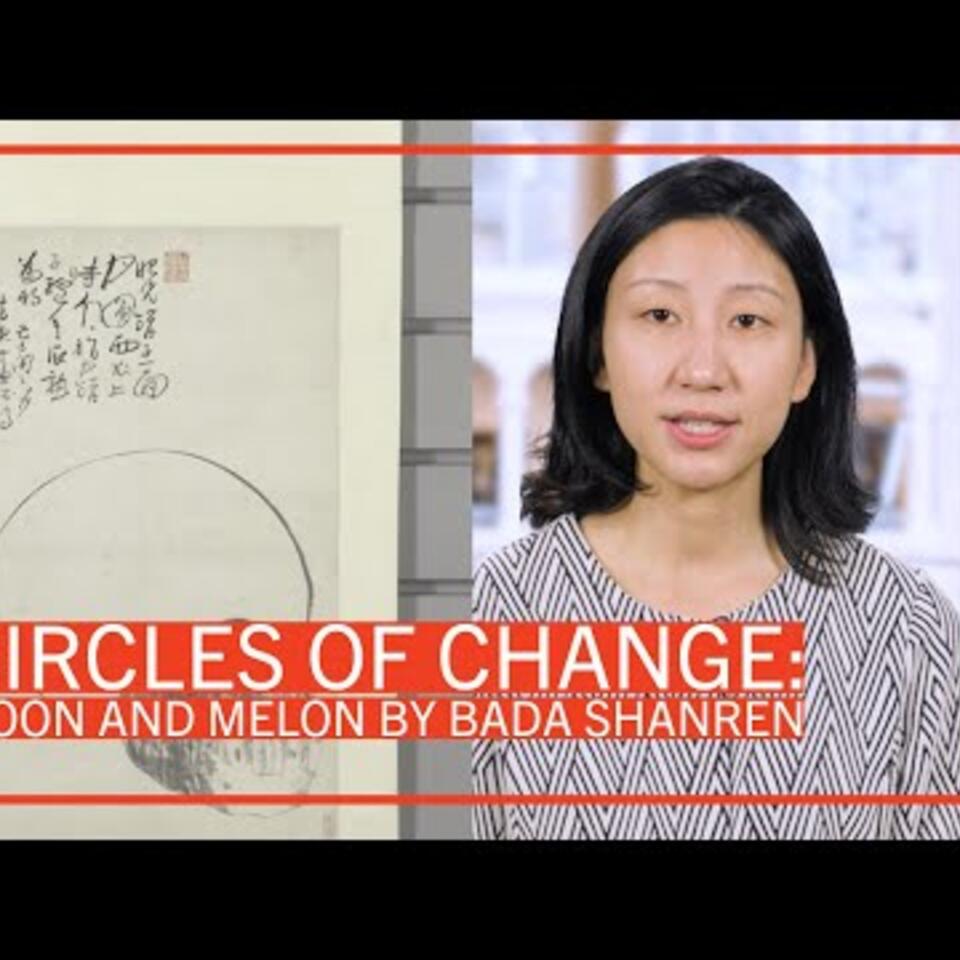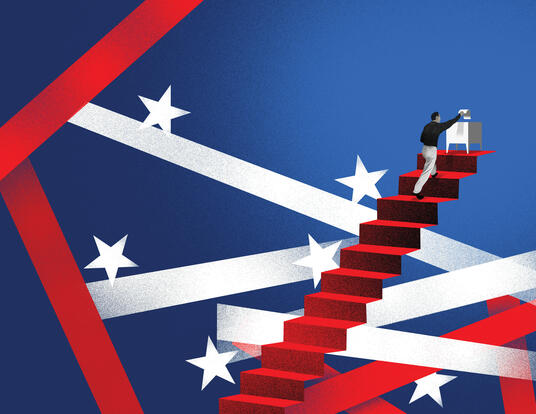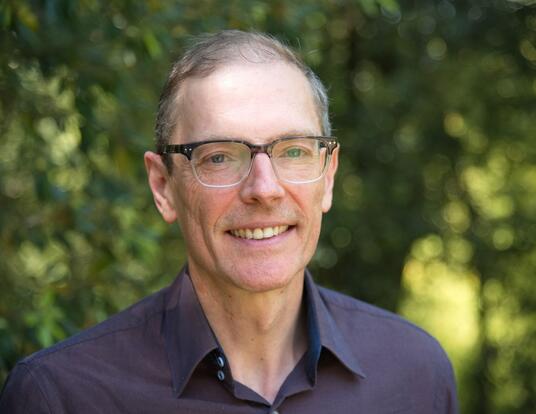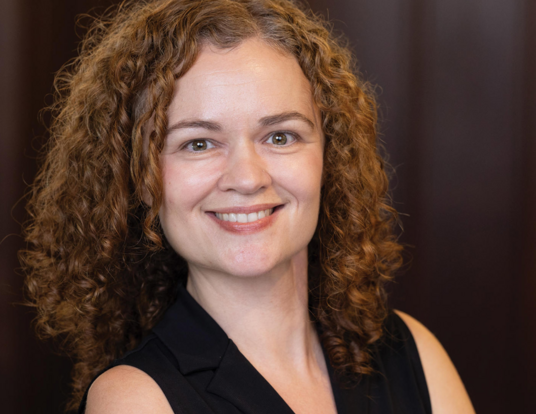From Resistance to Research
PhD student Yevhenii Monastyrskyi leverages his skills as a scholar for the sovereignty and security of his native Ukraine
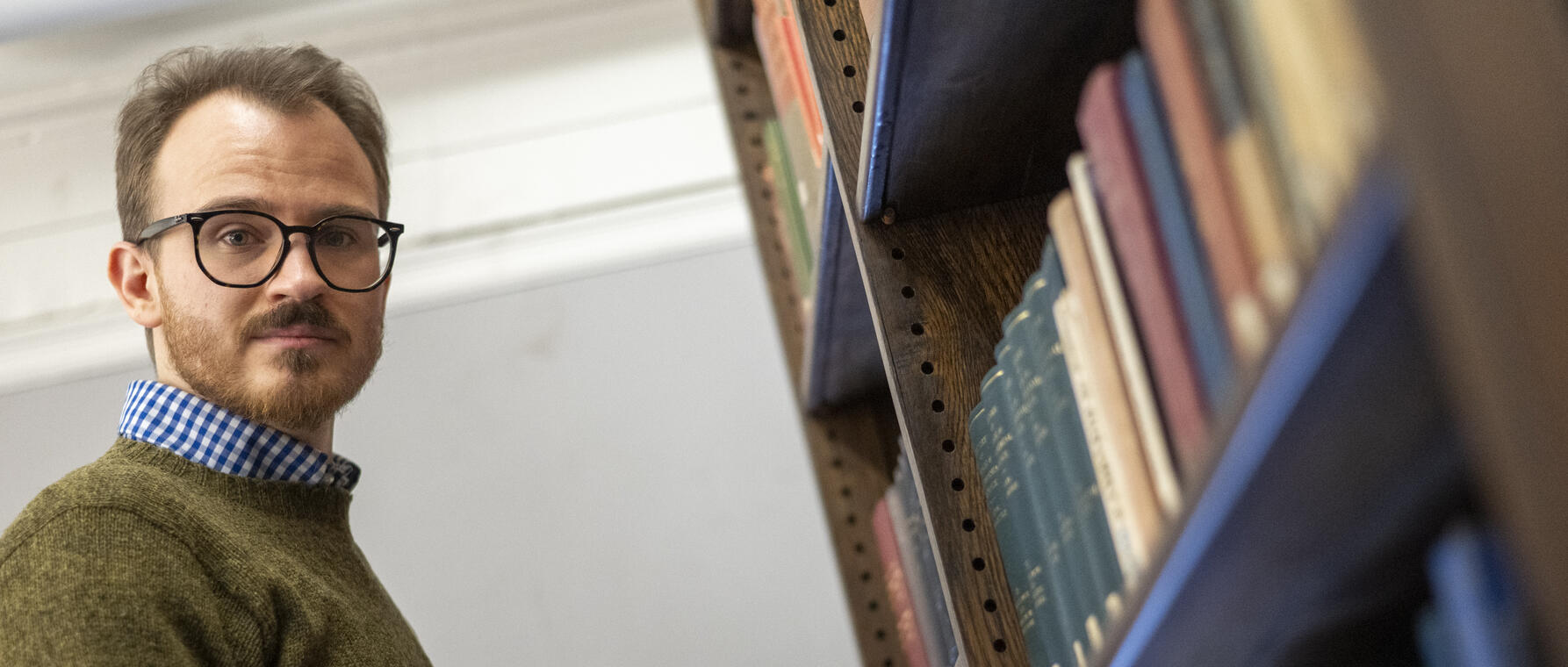
Research at Risk: Since World War II, universities have worked with the federal government to create an innovation ecosystem that has yielded life-changing progress. Now much of that work may be halted as funding is withdrawn. Find out more about the threats to medical, engineering, and scientific research, as well as how Harvard is fighting to preserve this work—and the University's core values.
When Russian separatist guerrillas stuffed Yevhenii “Zhenia” Monastyrskyi and his four friends into the back of a black Chevy Suburban and drove them to the recently seized security services building in the Ukrainian city of Luhansk, he was pretty sure they wouldn’t make it out alive.
“It was a torture house,” he says. “I used the five-minute ride to delete photos and texts from my phone [that were evidence of his work with the local resistance] and prepared for the worst.”
Monastyrskyi, who joined the resistance in the wake of his home city’s seizure by Russian-backed separatists in the spring of 2014, did make it out after three harrowing days in custody. Some months later, he left Luhansk, where his family had lived for generations, out of concern for his safety—and theirs. Though he has never been back, the thoughts of the PhD student in history at Harvard's Kenneth C. Griffin Graduate School of Arts and Sciences (GSAS) are rarely far from home as he leverages his scholarly skills and knowledge to support his country’s ongoing struggle for sovereignty and security.
Summer of Struggle
“Russia started its war on Ukraine not in February 2022 but in February 2014 by annexing Crimea, the first territorial annexation in Europe since WWII,” says Serhii Plokhii, Harvard's Mykhailo S. Hrushevs'kyi Professor of Ukrainian History, director of the University's Ukrainian Research Institute, and Monastyrskyi’s faculty advisor. “A few months later it sent its mercenaries and eventually regular troops to the Donbas region of eastern Ukraine.”
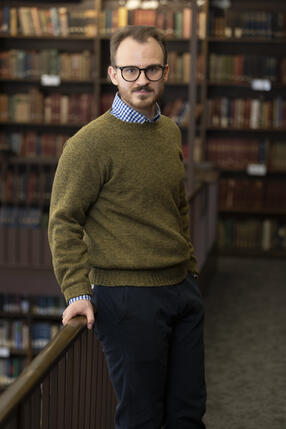
After a May referendum on independence that Plokhii describes as “fake” and “not recognized by the international community,” armed insurgents in Luhansk and Donetsk, which together form the Donbas region of Ukraine, declared the cities “people’s republics.” As the Ukrainian government mobilized its military in an anti-terrorist operation, Monastyrskyi and his friends launched a resistance effort from within occupied territory.
Because they were inconspicuous and knew intimately the streets and alleys of Luhansk, Monastyrskyi’s group was able to gather valuable intelligence to pass to the government in Kyiv. “We were locals, so we could walk around,” he says. “We would just hover around a place to see where the tanks and trucks were going so the Ukrainian government knew where the ammunition bases were or how many people were coming into a certain location every day. We would relay the information using this app that basically turns your smartphone into a walkie-talkie.”
Ironically, Monastyrskyi and his friends weren’t gathering intelligence when they were picked up; they were just walking home. “Our friend was closing his coffee shop, and we went down for a last hurrah,” he remembers. “We all lived in the same neighborhood and were walking back when a Suburban drove in front of us on the sidewalk. Three people with AK-47 assault rifles walked out and apprehended us in the middle of the street.”
The fact that their abductors were guerrillas with an unclear chain of command was particularly disconcerting for Monastyrskyi. “Unlike Crimea, there was no occupational government where they established some rules,” he explains. “Here, it was a gray zone. So, when we were apprehended and taken to the Security Service basement, I was maybe 80 percent sure that I would never walk out from that place.”
When we were apprehended and taken to the Security Service basement, I was maybe 80 percent sure that I would never walk out from that place.
–Yevhenii Monastyrskyi
Monastyrskyi minimizes the physical violence he experienced during the abduction, saying that he and his friends were “just roughed up a little.” He’s more grave about the psychological torture. “There were rounds of interrogation,” he says. “Sleep deprivation. They forced us to walk on the Ukrainian flag and mop up blood on the hallway floors. At one point, they lined us up against the wall as if they were about to execute us.”
Unable to find anything objectionable in their possession or to succeed in their interrogations, the insurgents let the group go after three days. Most of Monastyrskyi’s friends left Luhansk immediately. He stayed to be with his family and help care for his grandmother. By August, the Ukrainian army had encircled Luhansk, a blockade that would last nearly two months.
“The Russians were holding the city hostage and the front lines were all around us,” he says. “At one point, civilians tried to leave the city under a white flag, but the column was shelled by the Russians with many killed.”
When a mortar hit a transformer station, Luhansk went dark. With no electricity, running water, sewage, or internet connection, Monastyrskyi focused on two objectives. He continued to collect intelligence, although there was little opportunity to pass it to the Ukrainian government. Much of the rest of his time was dedicated simply to finding and transporting water in the blistering summer heat.
“The Donbas region is in the steppes,” he explains. “It’s basically an open field. And it’s very dry. August temperatures can get up to over 100 degrees Fahrenheit. My parents needed water. I also had two grandmothers living in different parts of Luhansk. So, I hunted for it and then carried between 100 and 140 liters of water per day all over town. I lost 12 or 13 kilos not so much because I didn’t eat but because of all the physical exertion.”
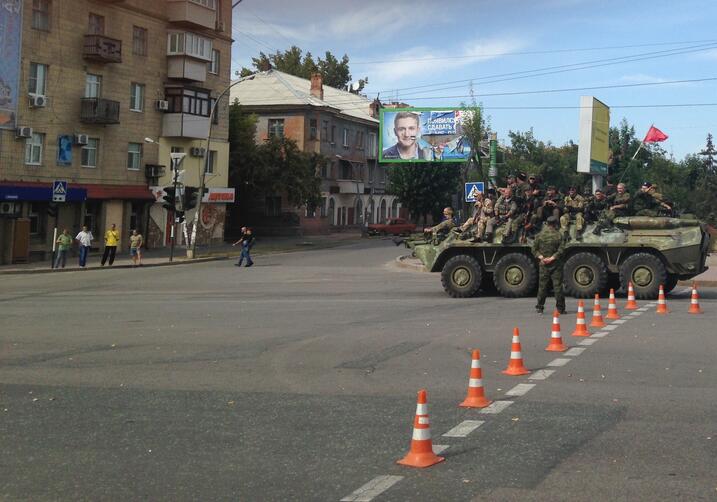
With the blockade lifted and power restored to Luhansk in late September, Monastyrskyi started to think again about his future. A friend in the Ukrainian army connected him with the Ukrainian Catholic University (UCU) in Lviv. Soon after, Monastyrskyi was admitted to the school’s master’s degree program in history with scholarship support. He left Luhansk, hoping to return for Christmas break. “I never did,” he says. “I left home on October 19, and I have never been back. Because I was arrested, I was worried about my safety and the safety of my family. My mom left in 2019. My father’s still there.”
Scholar and “Swiss Army Knife”
Monastyrskyi got his master’s degree at UCU, then became a visiting research assistant at Yale, working with faculty historians Timothy Snyder and Marci Shore. He returned to UCU to begin a PhD but became absorbed with applied social research related to the effects of war, particularly internal displacement. He put his degree on hold and returned to the US as a global dialogues fellow at the New School for Social Research in New York City. Before long, though, he was back in Kyiv researching marginalized communities and displaced people for international organizations, including the United Nations Development Programme, the Czech nonprofit People in Need, and the Danish Refugee Council.
“My sociologist friends call what I do the sociology of dead people,” Monastyrskyi quips. “So, I was doing that, thinking that I needed to earn some money and help my family but also that I was going back to academia sooner rather than later.”
After another stop at Yale from 2021 to 2023, during which he earned a second master’s degree in European and Russian studies, Monastyrskyi entered the PhD program in history at Harvard Griffin GSAS, focusing on the Soviet Union, the Comintern, and internationalist networks. Since 2020, he has also been the lead researcher at Ukraine’s War Childhood Museum, collecting oral histories from people who were under the age of 18 when the conflicts in Crimea and Donbas began. Svitlana Osipchuk, a program director at the museum, says the same skills that make Monastyrskyi an exemplary PhD student enabled him to assist in the organization’s efforts to positively contribute to the development of Ukrainian society.
“Yevhenii was one of the first researchers to join the museum's work in Ukraine,” she says. “In 2020-2021, he recorded 19 interviews for our archive, documenting the experiences of internally displaced children from the Luhansk and Donetsk regions and Crimea. Drawing on his extensive experience as a researcher, Yevhenii is helping shape the museum's vision for organizing the archive. His insights are guiding us in creating an archive that is accessible, respectful, and meaningful for generations to come.”
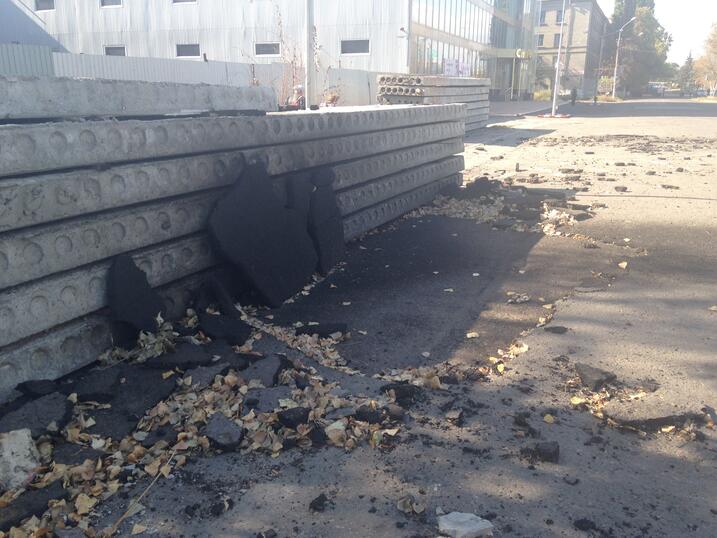
Monastyrskyi says he’s been involved in war matters for about a third of his life. His career has been structured around his expertise in society at war. He speaks with displaced persons who experience war every day. And yet, when Russia launched a full-scale invasion of Ukraine in February 2022, Monastyrskyi still felt that his world had irrevocably changed. “There was no more room for interpretation to say, ‘Oh, well, it's not war. It’s civil war. There are separatists. Crimea is not actually Ukraine.’ It was the moment when everything changed. War was there already, but it was still a shock.”
Like nearly every Ukrainian he knew, Monastyrskyi flew into activity looking for resources, connections, and other ways to help with his country’s defense. “Basically, every Ukrainian was a Swiss Army knife,” he says. “Every person, especially someone who could speak foreign languages, was a mediator. We were mobilizing people to speak out, to raise funds, and to do anything possible to help the war effort.”
We were mobilizing people to speak out, to raise funds, and to do anything possible to help the war effort.
–Yevhenii Monastyrskyi
In a different way than he had for the War Children’s Museum, Monastyrskyi put his knowledge and experience as a social researcher to work for Stabilization Support Services, a Canadian nonprofit that gathered and distributed humanitarian aid in Ukraine. “They asked me to step in and create a monitoring and evaluation framework, which is tricky in a war zone, where reporting is sketchy at best,” he says. “Every month, there were both quantitative and qualitative reports for donors. We wanted to raise more funds and to explain the gaps in aid where we needed to diversify our efforts.”
While studying at Harvard Griffin GSAS, Monastyrskyi is also on the faculty of the Kyiv School of Economics, building the institution's international outreach. “Yevhenii is one of the initiators of a very successful history program at the Kyiv School,” says Professor Plokhii. “Among other things, he helps to collect funds for the fellowship named after his friend, killed in action defending Ukraine from Russian aggression.”
Hope for the Homeland
As the third anniversary of the Russian invasion approaches, Monastyrskyi is concerned but optimistic about Ukraine’s future. He understands that a change in US presidential administrations will present new challenges for his country but refuses to despair. “The winter months will be tough with Russia targeting the electrical system,” he says. “We are dependent on the European Union, the United States, and other Western allies not just to support, but also to repel Russian aggression further on. The good thing for Ukraine is that it ramped up its arms production, so now we require less shipment of arms and more investment in our own production of technologies being tested in the field every day.”
Marci Shore, author of a history of the 2013-2014 Ukrainian revolution and one of Monastyrskyi’s professors and mentors at Yale, calls her former student “one of the most remarkable people I've ever met.” She says that, despite the ongoing war, she is hopeful that the country will defend its independence and that Monastyskyi will play a part in its future.
“He has been incredibly brave and incredibly generous, principled, and committed,” she says. “I believe that Zhenia will go on to play a crucial role in the rebuilding of post-victory Ukraine, in particular in the context of rebuilding universities and educating the next generations. He understands deeply why history matters and why telling the truth about history matters.”
After three years of war, Monastyrskyi’s hopes for his country are simple and poignant: “I want Ukraine to be a sovereign, independent country, and I want its borders to be internationally recognized,” he says. So are his hopes for himself. “I want to go home, you know? I want to see my father.”
Banner photo by Tony Rinaldo
Get the Latest Updates
Join Our Newsletter
Subscribe to Colloquy Podcast
Simplecast


